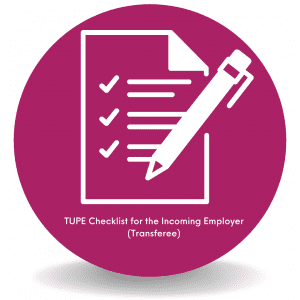This guide is to be used by the employer who is buying a business or taking on the responsibility for a service that has previously been provided by another employer, known as the incoming employer or transferee.
Not all stages of this checklist will be appropriate to each transfer and it is always advisable that professional legal advice is sought at an early stage in the process.
1. Does TUPE apply to the transfer?
TUPE applies to a “relevant transfer”, which means either or both of the following:
- A transfer of a business, or part of a business where there is a transfer of an economic entity that retains its identity (a business transfer).
- A client engaging a contractor to do work on its behalf, reassigning the contract or bringing the work “in-house” (a service provision change).
In the majority of cases, TUPE will not apply to the transfer of shares.
2. Before making an offer or committing to a transfer
Before you commit to a purchase price, tender proposal or to take on a lease for a building or business, you should ask a number of questions:
- How many employees are associated with the transaction and would they transfer under TUPE?
- What are their current terms and conditions and would these be viable going forward?
- Will you need to make redundancies? Unless agreed with the outgoing employer, you would be responsible for any redundancy costs.
- Overall, it is viable for you to take on the business or service when weighing up employment costs alongside profits and other outgoings.
3. Request due diligence information and/or employee liability information from the outgoing employer or transferor.
You should request this information at the earliest opportunity and ideally be in receipt of this information before you have committed to the transfer. You will need to scrutinize the information you receive. You can verify the information by asking further questions or asking to visit the premises and to speak with the affected staff. You may also disagree with all employees listed on the transfer list and should raise any objections as early as possible.
You should receive this information not less than 28 days before the transfer. Any information received before 28 days may be redacted to protect the personal information of the employees to comply with data protection laws.
4. Establish clear lines of communication between yourself and the employees
You should liaise with the outgoing employer as to whether all communication should go through them or whether you have permission to liaise with the trade union, elected employee representative or employees directly. In some circumstances, the outgoing employer may need to facilitate elections for an employee representative to be appointed. You should ask for time scales if this is the case.
5. Inform and Consult- What changes, if any, will you need to make to the employees existing terms and conditions.
Both parties in a TUPE transaction have a duty to inform and consult. You should provide the outgoing employer or the elected representative with a list of measures that you plan to make. This includes any changes you would like to make to terms and conditions, pay dates, location, redundancies etc. You will need to agree with the outgoing employer whether you have permission to consult directly with the representatives or employees or whether the outgoing employer will assume this duty. You should bear in mind that TUPE preserves an employees existing terms, conditions and rights and changes to these could be illegal and should therefore be carefully managed.
If redundancies are required then these must be conducted in a fair way. The redundancies would generally take effect on day 1 of the transfer which means that you must ensure that a fair selection process is undertaken including considering any of your own existing members of staff in the pool.
6. Will you require any warranties or indemnities within the transfer documentation to protect your business.
TUPE not only transfers employees between businesses but also transfers existing rights and potential claims. This means that as the incoming employer you will want to ensure that you do not become liable for any mistakes, negligence or claims committed by the outgoing employer prior to transfer. You can request provisions within any transfer agreement that deal with any existing liabilities for the employees.
7. General planning and timescales
As soon as you are aware that a transfer will take place, timely communication and consultation with staff is key. It is also advisable to set out time scales so that all parties involved know what to expect. The transition to your employment should be as seamless as possible. You can achieve this by ensuring that payroll is set up ready, staff know what to expect on the first day and there is an induction and training plan for staff going forward. Within 60 days of the transfer, you must also confirm that the transferred employees have the right to work in the UK. Obtaining legal advice at an early stage is also advisable to ensure that you are legally compliant but also protecting yourself and your business.
We are in Your Corner
For advice contact us today for your free telephone consultation







